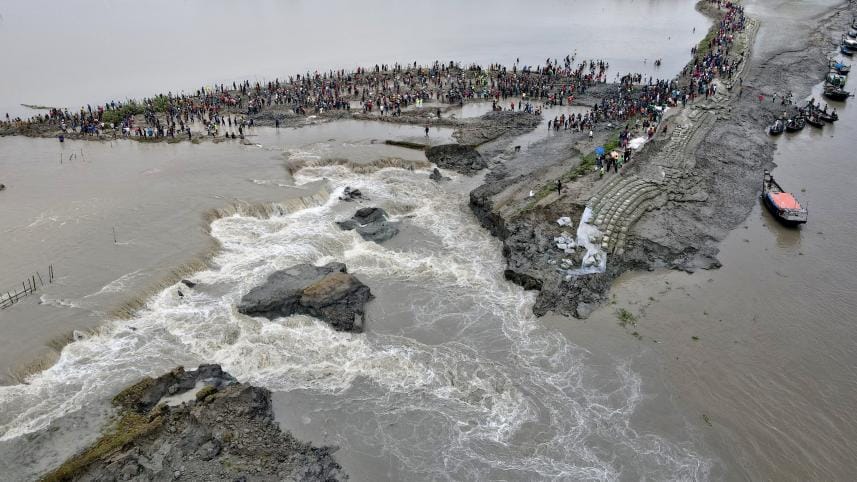2024 floods: Facts, feelings, and the art of engineering diplomacy

Just weeks after mass protests toppled Bangladesh's long-serving prime minister, the country is now grappling with a new crisis: devastating floods that have claimed lives and affected millions. With communication lines down and vital infrastructure damaged, the interim government faces the dual challenge of managing the disaster and combating the surge of misinformation.
In times of crisis, feelings often overshadow facts. Yet, distinguishing between the two is crucial for effective disaster management. This is where the art of engineering diplomacy can make a difference. By fostering cooperation with India, Bangladesh can develop a more reliable flood forecasting system. This collaboration can also help rebuild trust with India, shifting the focus from blame to exploring joint solutions for many shared problems.
The 2024 floods in Bangladesh didn't just happen by chance—they were the result of a perfect storm of climatic events. Firstly, we're in the thick of the monsoon season, which is hitting harder than usual this year. Add to that the Madden-Julian Oscillation, a powerful force driving warm, moist air from the Bay of Bengal toward the coast. To top it off, the jet stream over Central Asia has been positioned in a way that funnels even more rain into both Bangladesh and India. The combination of these factors has led to a series of intense rainfall events since late May, causing unprecedented flooding in many parts of both countries.
But not all floods are created equal, and this year's have been particularly early and severe. In late May, Cyclone Remal hammered southern Bangladesh and eastern India, with widespread floods leaving nearly 30 million people without power. Then, mid-June brought relentless rains that submerged Sylhet and Sunamganj, areas that received 242mm of rain in a single day—well above the monthly average. Southeastern regions didn't fare much better, with additional storms causing severe flooding in places like Feni and Cumilla.
On August 21, Feni recorded an unprecedented 312mm of rain in a single day, causing several rivers in the region to swell beyond danger levels. While extreme rainfall has been the primary catalyst for these floods, there is also speculation that the release of excess water from dams and barrages may have contributed to localised impacts. However, these releases are unlikely to be the main cause of the widespread inundation.
For context, consider the Dumboor Dam on the Gomati River in Tripura, India, which has a capacity of around 670 million cubic metres. By comparison, the rainfall over Feni on August 21 alone generated approximately 300 million cubic meters of water. This suggests that the rainfall itself played a much larger role in the flooding than any water released from the dam.
Across social media, many in Bangladesh are pointing fingers at India, accusing it of worsening the floods by releasing water from its dams and barrages. India has countered these accusations, attributing the flooding to natural factors, primarily the heavy monsoon rains.
The deep-seated mistrust between Bangladesh and India, exacerbated by recent geopolitical tensions and the spread of misinformation, has multiple layers. First, since Bangladesh's independence in 1971, India has often been perceived as a dominant regional power, influencing political and economic decisions within Bangladesh. Second, the close relationship between India and the recently ousted government of Bangladesh has intensified perceptions that former's interests have been prioritised over the latter's national interests, solidified by the former prime minister's exile in India. Third, the employment of Indian professionals in Bangladesh, despite high local unemployment, has deepened feelings of economic exploitation, compounded by the growing trade imbalance between the two countries. Fourth, long-standing disputes over water-sharing, especially involving the Ganges and Teesta rivers, have been a major source of tension. And finally, the spread of misinformation, fuelled by geopolitical developments, has exacerbated existing distrust.
To navigate disasters like the 2024 floods effectively, we must separate facts from fiction. This is where engineering diplomacy becomes crucial. It's not just about constructing physical infrastructure—it's about building trust and cooperation, both within our borders and beyond.
Two recent developments highlight this approach in action. First, the remarkable relief efforts led by students at Dhaka University, who mobilised to provide support to flood victims, demonstrate the power of grassroots action in the face of a disaster. Second, Chief Adviser Dr Muhammad Yunus's proposal to establish a high-level mechanism between Bangladesh and India to jointly tackle emergencies like floods signals a significant step towards regional cooperation.
The interim government has a unique opportunity to leverage this moment, not only to enhance flood forecasting systems, but also to address broader issues with India. By adopting a principled pragmatic framework, Bangladesh can develop solutions that are technically sound, socially acceptable, ethically responsible, and politically feasible. Some key areas for collaboration may include: developing a shared flood forecasting system that integrates processes, people, and politics, operationalising agreements to protect the Sundarbans, exploring infrastructure projects that enhance regional connectivity through Bangladesh, and addressing economic disparities and trade imbalances.
The floods of 2024 have shown us that it's time for a new approach—one that combines technical know-how with diplomatic skills. As M Inamul Haque correctly pointed out in this daily, "This situation needs to be handled diplomatically… we must avoid panicking, even though it's difficult. Panicking often leads to more problems." In these fast-moving and uncertain times, we need to be both principled and pragmatic.
Shafiqul Islam is director of Water Diplomacy, professor of civil and environmental engineering and water diplomacy at the Fletcher School of Law and Diplomacy at Tufts University, US.
Views expressed in the article are the author's own.
Follow The Daily Star Opinion on Facebook for the latest opinions, commentaries and analyses by experts and professionals. To contribute your article or letter to The Daily Star Opinion, see our guidelines for submission.




 For all latest news, follow The Daily Star's Google News channel.
For all latest news, follow The Daily Star's Google News channel.
Comments